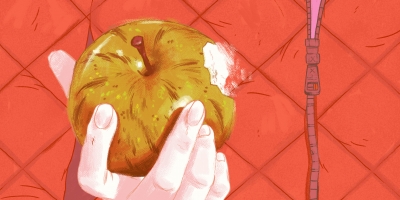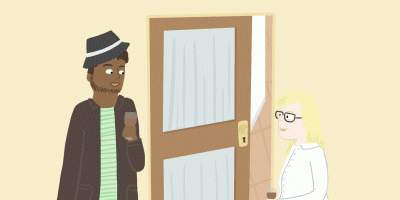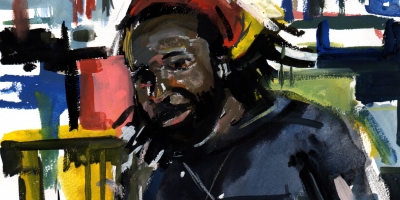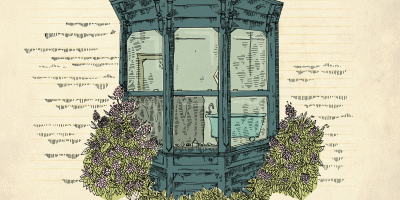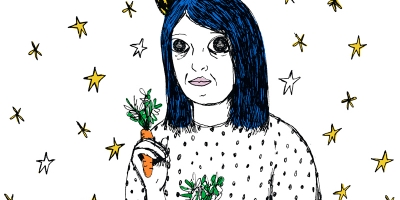Nonfiction
Via Milan
by Sarah Kasbeer

I met Manuel during the first week at our new school in Milan. He was tall, dark, and Paraguayan. A pinstriped hat rested slightly askew on his head, rocking back and forth as he doodled fashion garments in a black sketchbook. Most of the other international students had arranged their apartments before arriving, and it was only at the suggestion of a Brazilian classmate that we decided to live together. It turned out to be the perfect match: personality-wise, we were quite compatible and, romantically speaking, we both preferred men.
Manuel and I took a chance on the only affordable housing we could find near the city center that wouldn’t result in certain death by home invasion—a quaint, New York–sized apartment directly across the street from a large prison. On our first night, we watched the guards pace back and forth on the prison walls, wearing berets and smoking cigarettes, AR70s swinging from their green uniforms like sashes on Girl Scouts. Who dwelled behind its walls, we wondered—murderers? Rapists? Khaki-clad American tourists who’d accidentally driven in the bus lane? Compounding the strangeness of the neighborhood was a quiet business hotel called the Sant’Angelo. We hypothesized the prison held its conjugal visits there, accessible via a secret underground tunnel, which would explain why you never saw anyone coming or going.
We had both moved to Milan to study design and learn Italian. The problem with the latter remained our utter refusal to integrate into society. When we weren’t drinking wine on our tiny balcony, we could be found drinking wine in our tiny kitchen. A Murphy-style table folded out from the wall, and when it was in “eating” position, Manuel and I would sit across from one another on stools, leaning against a doorway and refrigerator respectively. Pre-dinner, we had to remove all the necessary condiments from the refrigerator—olive oil, Parmesan, Nutella—because once the table was set, opening it proved logistically impossible.
I experienced my first real culture shock at our neighborhood supermarket. When it comes to queuing up at the checkout, American rules do not apply. The concept of personal space has not quite caught on. I often felt the warm breath of an elderly man on the back of my neck, only to turn around and find his head nestled snugly under my chin. And for some reason, you had to have exact change when paying in cash. With so much exact change, I’m not sure why they couldn’t break a twenty, but it just wasn’t the kind of thing you asked. It would be like questioning the metric system, what the shopkeepers did during four-hour afternoon closings, or why “man lurking in doorway” seemed a viable occupation. If you did, it would warrant an indignant scoff, as if you were querying their universal right to tax evasion.
At home, we watched American movies that had been dubbed over into Italian. Manuel listened intently while I tried to read lips. As a native Spanish speaker, he spoke better Italian after two weeks than I did after six months. No matter how many times I heard the foreign version of Morgan Freeman narrate March of the Penguins, my language skills weren’t getting any better—except for when it came to describing the habits of emperor penguins, which rarely came in handy.
Halfway into our first semester, I was completely lost during lectures—and even more lost on the street. There is no real Italian translation for the word “block,” since the city does not follow a grid system. If you asked for directions, you’d likely receive a detailed response, however useless: Go some meters that way and turn right at the arch—not the little one but the big one. You’ll see a fountain and then a doorway. Walk around it toward a big square into a smaller square veering left. Follow the circle and it will be twenty meters to your right.
Hence, I was wandering around one day when the wind picked up, bringing with it a small yet tenacious rock, which lodged itself squarely in my cornea.
“A piece of the road entered into my eye,” I explained to the attending physician at an urgent care center, wishing I had instead learned the word for “chunk.”
He looked at me dumbfounded. “And you weren’t wearing glasses?”
I pondered momentarily how to explain that I don’t walk around with the optical equivalent of a tinted windshield across my face at all times—and especially not during a thunderstorm. Since I didn’t know the Italian word for “windshield,” I just shook my head in defeat.
The doctor sent me to the nearest open pharmacy across town to pick up eyedrops. I shuffled onto the metro using my elongated umbrella as a cane, in a futile attempt to shift attention away from my eye patch. In Milan, they stare for sport, and being visually impaired does not excuse you from the game. An opponent will focus like a soccer player attempting to land a penalty kick during sudden-death overtime. Such concentration was impossible to faze, even with my cycloptic stink-eye.
When I finally arrived at the “twenty-four-hour” pharmacy, there was a handwritten note on the door: “Be back in thirty minutes.”
If the need to kill time arises, at least there’s one elixir that always seems to be available: coffee.
Midway through our second semester, I noticed Manuel was experiencing a similar level of frustration, which he combated with a newfound sense of national pride.
“I am from Paraguay, but this is a third-world country!” he announced, swiveling his hips and waving his pointer finger when he ran out of money and found out Italian banks didn’t issue credit cards. I noticed he was also dressing more overtly South American, in wildly embroidered cotton shirts, whitewashed jeans, and snakeskin boots. He began drinking his maté on the go—via a metal straw attached to a thermos, disguised in a tan leather bag. While the French are credited with haute couture and the Italians prêt-à-porter, when it comes to the wearable beverage, the Paraguayans are not to be trifled with.
Like me, he was also craving Mexican food.
“You can drop us off on the corner after the stoplight across from the prison,” I rattled off to a taxi driver one evening, eight months into my year there. We were on our way home from dinner at El Tropical Latino, a faux-Mexican restaurant that put beans in their lasagna and called it “enchiladas.”
“Wow, your Italian has really improved,” said Manuel. “People can actually understand you.” The lingual constipation that once sat in the pit of my stomach like a saffron risotto had finally cleared.
“Hello moto,” rang my telefonino as we exited the taxi.
“Pronto,” I answered.
It was my mother calling about my father’s upcoming visit to Milan. “He wants to stay at the hotel next door to you. Do you think it’s safe?” she asked.
He was planning to stop over on the back end of a trip to Africa, where he volunteered at a rural clinic. A regular Mother Teresa, my father had long since taken a vow of poverty—at least when it came to hotel accommodations.
He arrived at the Sant’Angelo two weeks later bearing an unexpected treasure. A local artisan from Zambia had given him a model of an indigenous homestead: a miniature, thatched hut that he’d carefully packed in a box for the twelve-hour flight from Lusaka.
“You can come up to my room if you want to see it,” he said excitedly over the phone. “Although, they have some weird policies with guests. I think you have to show your passport.” This did not surprise me—I basically had to bend over and cough just to get a Blockbuster card, yet a prescription for a Schedule IV substance was written on a regular old piece of paper not collected by the pharmacy when filled.
“I’ll come downstairs for you and wait for my car,” Manuel offered. He was heading out for a boys’ night, and I to pick up my father for dinner. Hailing a taxi in Milan was nearly impossible, so we usually called a service and asked the driver to pick us up at the Sant’Angelo. While I’d waited in front of the hotel many times, I’d never actually been inside—until now.
“Ciao, roomie,” I said, and with a single air kiss, left Manuel on the curb.
Ding. Ding. Ding.
I rang the bell in the lobby impatiently until a man stepped out of the back office.
“I am here to see my father, room fourteen,” I politely explained in Italian.
He lowered his glasses and raised an eyebrow. “Tuo padre?”
“Si, mio padre.”
I offered my passport, demonstrating that we shared the same last name. One could also infer our relationship by comparing the two photos, in which we appeared as evil intergenerational twins. Without even looking at it, he made a photocopy and then handed it back to me, clucking his tongue.
As I headed toward the elevator, he said something that stopped me in my tracks: “Venti minuti—basta.”
I knew the words, but couldn’t decipher their meaning in present context. The elevator doors closed, and my face flushed.
“Twenty minutes—that’s all,” he’d said.
It’s pretty embarrassing to be mistaken for a prostitute, especially when the alleged john is actually your dad.
“Oh honey,” said Manuel, after I returned home later that night. “He thought you were a Russian hooker.” It may also have had something to do with the flamboyant Paraguayan pimp loitering outside in his snakeskin boots and pinstriped hat, drinking maté out of a tan leather satchel—but I didn’t mention it.
When my studies in Milan finished a few months later, I moved to New York, where I adapted quite easily. Basic inconveniences that would befuddle a normal American rolled right off the coattails of my tailored black jacket. The taxi driver doesn’t speak English? I can gesticulate. This restaurant doesn’t take credit cards? I’ve got cash. You can be in all three rooms of this apartment at once? I’ll take it.
New York suited me, and the more adept I became at identifying nuanced bodega odors, the more I noticed my memories of Milan shifting. I looked back on the beer-and-cigarette vending machines that lined the prison walls fondly—they were, after all, more appealing than the half-burnt-out sign I could see from my new apartment window that read “Purlington Cat Factory.” I missed the morning pastries enjoyed standing while swirling a miniature spoon of sugar into a matching cup of espresso. I missed the men in fitted black Armani suits unapologetically eating pink ice-cream cones in the streets after lunch. I missed Manuel’s famous late-night plates of spaghetti alla carbonara—and almost forgot about the morning trail of ants filtering in from the balcony.
We always think our lives could be better somewhere else. But for the most part, they stay the same, just with different GPS coordinates. Manuel remained in Italy another year before moving back to Paraguay. A few years later, he showed up at my doorstep during New York fashion week. He was hoping for the same thing I’d so fervently sought upon moving here—something Milan was never able to give us.
“Sorry,” I told him. “There’s no good cheap Mexican food here either.”
